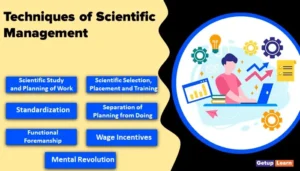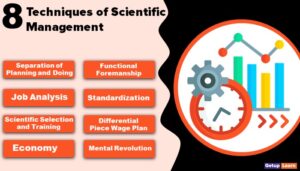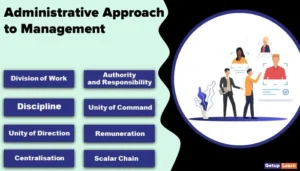Table of Contents
Why do We Study Management?
Management is principally a task of planning, coordinating, motivating, and controlling the efforts of others toward a specific objective.
It involves combining the traditional factors of production land, labor, and capital in an optimum manner, paying due attention to the organization’s particular goals.
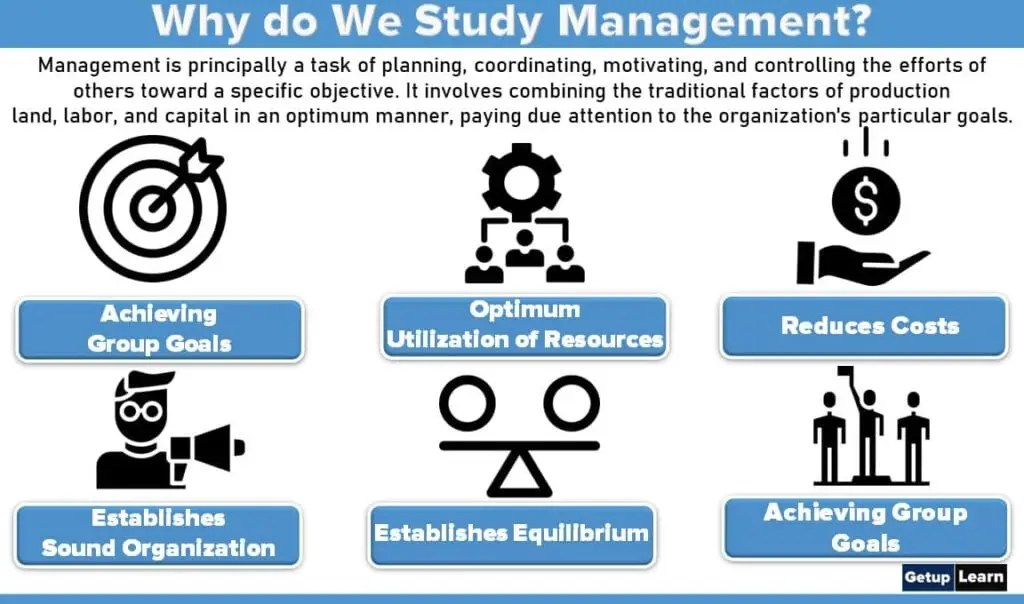
6 Study Management Tips
These are the best 6 study management tips explained below:
- It helps in Achieving Group Goals
- Optimum Utilization of Resources
- Reduces Costs
- Establishes Sound Organization
- Establishes Equilibrium
- Essentials for Prosperity of Society
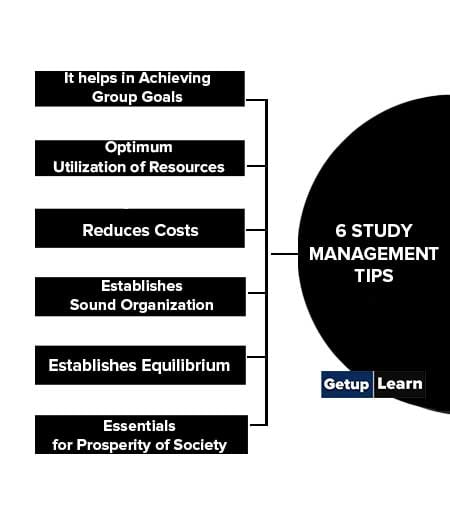
It helps in Achieving Group Goals
It arranges the factors of production, assembles and organizes the resources, and integrates the resources in an effective manner to achieve goals. It directs group efforts toward the achievement of pre-determined goals. By defining the objective of the organization clearly, there would be no waste of time, money, and effort.
Management converts disorganized resources of men, machines, money, etc. into useful enterprises. These resources are coordinated, directed, and controlled in such a manner that the enterprise work towards the attainment of goals.
Optimum Utilization of Resources
Management utilizes all the physical & human resources productively. This leads to efficacy in management. Management provides maximum utilization of scarce resources by selecting its best possible alternate use in industry from out of various uses.
It makes use of experts, and professionals, and these services lead to the use of their skills, knowledge, and proper utilization and avoid wastage. If employees and machines are producing their maximum there is no under-employment of any resources.
Reduces Costs
It gets maximum results through minimum input by proper planning and by using minimum input & getting maximum output. Management uses physical, human, and financial resources in such a manner that results in the best combination. This helps in cost reduction.
Establishes Sound Organization
No overlapping of efforts (smooth and coordinated functions), to establish a sound organizational structure is one of the objectives of management which is in tune with the objective of the organization, and for the fulfillment of this, it establishes effective authority & responsibility relationship i.e. who is accountable to whom, who can give instructions to whom, who are superiors & who are subordinates.
Management fills up various positions with the right persons, having the right skills, training, and qualification. All jobs should be cleared to everyone.
Establishes Equilibrium
It enables the organization to survive in changing environment. It keeps in touch with the changing environment. With the change in the external environment, the initial coordination of the organization must be changed.
So it adapts organizations to changing demands of the market/changing needs of societies. It is responsible for the growth and survival of the organization.
Essentials for Prosperity of Society
Efficient management leads to better economic production which helps in turn to increase the welfare of people. Good management makes a difficult task easier by avoiding the wastage of scarce resources.
It improves the standard of living. It increases the profit which is beneficial to business and society will get maximum output at minimum cost by creating employment opportunities that generate income in hands. Organization comes with new products and research beneficial for society.
Process of Management
Management as Process: As a process, management refers to a series of interrelated functions. It is the process by which management creates, operates, and directs purposive organization through systematic, coordinated, and co-operated human efforts.
According to George R. Terry: Management is a distinct process consisting of planning, organizing, actuating, and controlling, performed to determine and accomplish stated objective by the use of human beings and other resources.
These are the three basic and core steps for the process of management:
- Management is a Social Process
- Management is an Integrating Process
- Management is a Continuous Process
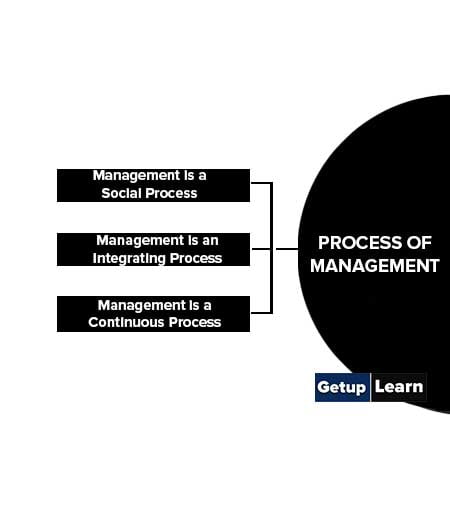
Since the human factor is most important among the other factors, therefore management is concerned with developing relationships among people. It is the duty of management to make the interaction between people productive and useful for obtaining organizational goals.
Management is an Integrating Process
Management undertakes the job of bringing together human physical and financial resources so as to achieve the organizational purpose. Therefore, is an important function to bring harmony between various factors.
Management is a Continuous Process
It is a never-ending process. It is concerned with constantly identifying the problem and solving them by taking adequate steps. It is an ongoing process.
Why We Study Management?
Management is the creation and maintenance of an internal environment in an enterprise where individuals working in groups, can perform efficiently and effectively toward the attainment of group goals. It is the art of getting the work done through and with people in formally organized groups. By Koontz and O’Donnel,
What are study management tips?
Following are the 6 study management tips:
1. It helps in Achieving Group Goals
2. Optimum Utilization of Resources
3. Reduces Costs
4. Establishes Sound Organization
5. Establishes Equilibrium
6. Essentials for Prosperity of Society.
What is the process of management?
Following are the three process of management:
1. Management is a Social Process
2. Management is an Integrating Process
3. Management is a Continuous Process.


